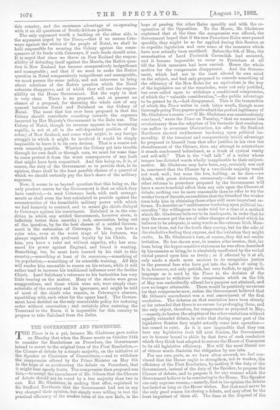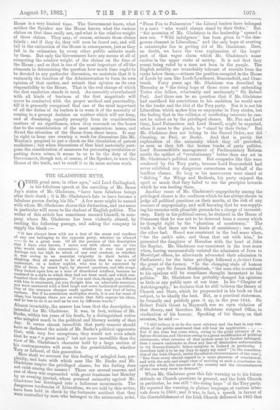THE GOVERNMENT AND PROCEDURE.
THE Times is in a pet, because Mr. Gladstone gave notice on Monday that when the House meets on October 24th to consider the Resolutions on Procedure, the Government intend to revert to the original form of the First Resolution,— the Closure of debate by a simple majority, on the initiative of the Speaker or Chairman of Committees,—and to withdraw the compromise offered by the Primo Minister on May 6th an the hope of so accelerating the debate on Procedure, that at might bear speedy fruits. The compromise then proposed was this,—to accept the amendment of Mr. Gibson that the Closure of debate should not be voted by a less majority than two to one. But Mr. Gladstone, in making that offer, explained to Sir Stafford Northcote that the Government had not in any way changed their opinion, but simply were willing to test the practical efficiency of the weaker form of the new Rule, in the
hope of passing the other Rules speedily and with the co- operation of the Opposition. To the House, Mr. Gladstone
explained that at the time the compromise was offered, the Government hoped that if the new Procedure Rules were passed speedily, they might be so far applied during this Session as to expedite legislation and save some of the measures which have now actually been sacrificed. Before the 8th of May, the assassination of Lord Frederick Cavendish had occurred, and it became impossible to recur to Procedure at all till the Irish measures had been carried. Hence the whole motive for the compromise disappeared. And the Govern- ment, which had not in the least altered its own mind on the subject, and had only proposed to concede something of the efficiency of the New Rules for an equivalent in the way of the legislative use of the remainder, were not only justified, but even called upon to withdraw a conditional compromise, of which the "valuable consideration,"—the public advantage. to be gained by it,—had disappeared. This is the transaction of which the Times writes in such bitter wrath, though more thorough-going Tory papers quite admit the perfect legitimacy of Mr. Gladstone's course :—" If Mr. Gladstone was conscientiously convinced," wrote the Times on Tuesday, " that no measure less revolutionary than the adoption of his fantastic first resolution can suffice to overcome Obstruction, his offer to Sir Stafford Northcote showed recklessness bordering upon political im- morality. If the transient and comparatively trivial advantage. he proposed to himself from that offer justifies in his view the abandonment of the Cloture, then any attempt to reintroduce it stands condemned beforehand, as a freak of cynical vanity and self-will." That is the "tall talk " of a writer whose temper has dictated words wholly inapplicable to their subject- matter. Mr. Gladstone may have been, nay, certainly was and is, convinced that the Closure by a two-thirds majority would not work well; but none the less, holding, as he does—we think, with great deference, erroneously—that some of the- other reforms in procedure proposed by the Government will have a more beneficial effect than any rule upon the Closure of debate, nothing can be more reasonable than to offer to try the weaker form of the rule, on condition that the friends of the weaker form help him in obtaining those other still more important re- forms. To describe as "recklessness bordering upon political im- morality " the willingness to make trial for a time of a method which Mr. Gladstone believes to be inadequate, in order that he. may the sooner get the use of other changes of method which he believes to be adequate, is using words as the extreme Irish Mem- bers use them, not for the truth they convey, but for the sake of the vindictive feeling they express, and the irritation they might. excite. In Mr. Gladstone's case, of course, they did not excite. irritation. He has shown now, in session after session, that, far from being the hyper-sensitive statesman he was often described by his enemies as being, he is absolutely unaffected by the verbal vitriol poured upon him so freely ; or if affected by it at all,. only made a shade more anxious to do scrupulous justice to the personal foes who have got into the habit of using it.. It is, however, not only pettish, but very foolish, to apply such, language as is used by the Times to the decision of the- Government to withdraw the compromise which on the 6th of May was undoubtedly offered for a purpose not attained, and now no longer attainable. There would be positively no excuse for that compromise now, unless the Government believed that Mr. Gibson's amendment was a real amendment of the first resolution. The debates on that resolution have been already so far extended that there is no excuse for prolonging them, and the only object, therefore, for compromise as proposed in May, —namely, to hasten the adoption of the otherresolutions without equally extended debate, in order that during some part of the. legislative Session they might actually come into operation— has ceased to exist. As it is now impossible that they can bear any legislative fruit till next Sassion, the Government are in honour bound to abide by that form of each resolution which they think best adapted to restore the House of Commons. to its old legislative efficiency. Nor will the most liberal use. of vicious words diminish the obligation by one iota. For our own parts, as we have often avowed, we feel con- vinced that the House ought to strengthen, not to weaken, the efficiency of the First Resolution, by making it the duty of the. Government, instead of the duty of the Speaker, to propose the. Closure of debate, and to propose it for any reasons which the- Gnvernment believe to be convincing to the House. The Speaker can only urge one reason,—naraely, that in his opinion the debate. has lasted as long as the House wishes. But that need never be the only good reason for closing a debate, and may often be the least important of them all. The time at the disposal of the
House is a very limited time. The Government know, what neither the Speaker nor the House knows, what the various claims on that time really are and what is the relative weight of those claims. They may, of course, estimate those claims falsely ; and, if they do, they will soon be found out, and will fall in the estimation of the House in consequence, just as they fall in its estimation by every other public mistake made by them. But only the Government have any means at all of computing the relative weight of the claims on the time of the House ; and as that is one of the most important of all the elements in determining the question how much time ought to be devoted to any particular discussion, we maintain that it is eminently the function of the Administration to form its own opinion of that matter, and submit that opinion on its own responsibility to the House. That is the real change of which the first resolution stands in need. An assembly overwhelmed with all kinds of business of the first magnitude will never be conducted with the proper method and punctuality, till it is generally recognised that one of the niost important of all the duties of its leaders is to warn it of the necessity of coming to a prompt decision on matters which will not keep, and of dismissing equally promptly from its consideration matters of no significance, when they encroach on the hours due to the consideration of the most momentous issues, and divert the attention of the House from those issues. It may be right to keep one evening a week for discussions like Mr. Warton's proposal to put a check on the circulation of patent medicines ; but when discussions of that kind materially post- pone the consideration of measures for preventing revolution or putting down crime, it seems to us to be the duty of the Government, though not, of course, of the Speaker, to warn the House of the truth, and to recall it to its more serious work.































 Previous page
Previous page